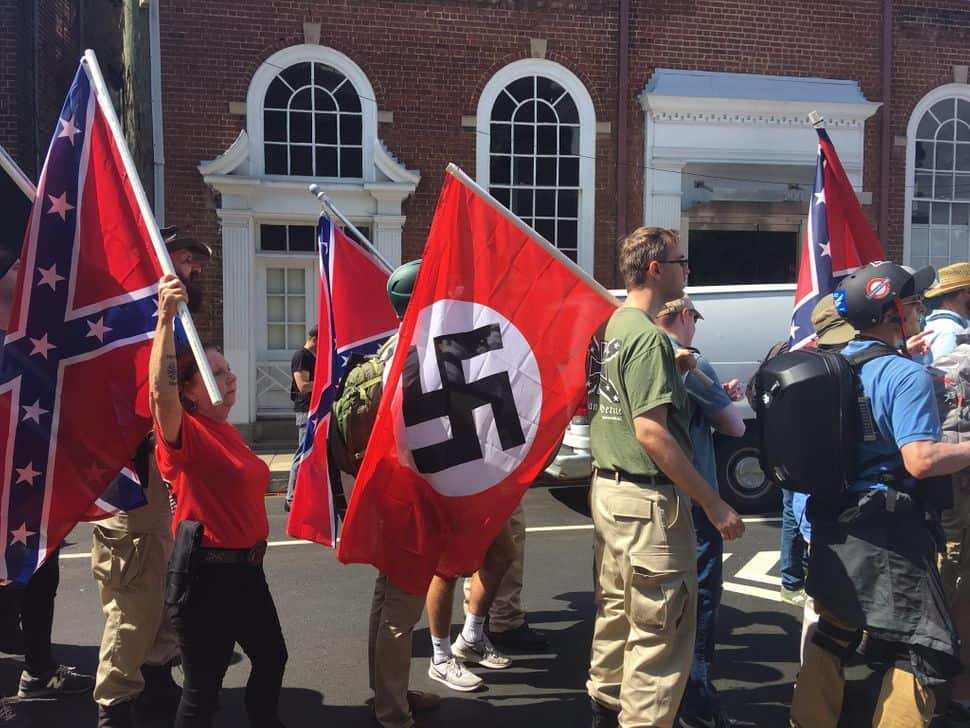Article, FEATURED STORIES, U.S.
The Resounding Hate of White Supremacy

Photo: ANDY CAMPBELL/Huffpost
White supremacy has always loomed near the surface of American society. It was rampant in the founding when masses of natives were slaughtered to make room for white settlers and when the new country went to war with itself over slavery.
White supremacy flourished openly when the U.S. was reconstructed after the Civil War under the notion that freedom was a right for all. The Ku Klux Klan formed to combat that idea as well as anyone who believed in it, whether by creating laws or enforcing violence, and the organization has been in and out of the shadows ever since.
The hate of white supremacy reverberates through all of the country’s history, quieted at times but never eradicated. This hate has burnt down whole towns and murdered thousands of innocent people. It also seems to thrive with the option of modern technology for connecting and sharing ideas.
Though white supremacy has always been an issue in America, there are still those who refuse to believe it is real, much less a current danger to citizens. Fox News host Tucker Carlson recently called white supremacy a “hoax” and claimed it’s “not a real problem in America” in spite of numerous mass shootings in recent history which have been carried out in its name. Carlson announced he would be taking a vacation from his show the next day and lost a few advertisers, but his comments earned support from well-known white supremacist, David Duke.
Trump the Nationalist
President Trump himself identified publicly as a “nationalist” — stopping short of embracing the role of white nationalist, which is defined by Merriam Webster as “one of a group of militant whites who espouse white supremacy and advocate enforced racial segregation.”
The difference between white supremacist and white nationalist, again according to Merriam Webster, is enforcement. While white supremacists believe their race is supreme and should control other races, nationalists take action to implement that belief, especially through violence.
Trump fits the dictionary definition of a white nationalist.
He blatantly said that a majority of Mexican immigrants are “rapists” who bring crime and drugs over the border to the U.S.
He banned travel from seven countries with predominantly Muslim populations after incorrectly complaining in the past that Christian immigrants were not being allowed into the country. (Interestingly, a large portion of the populations of Mexico and Central American countries like Guatemala identify as Catholic, but Trump has alleged that Hispanic immigrants are simply “invading” the country.)
He told four congresswomen of color to “go back” where they came from, in spite of the fact that three of them were born in America.
He denounced immigrants from what he called “shithole countries” in Africa and called Baltimore a “rat and
He encourages “enforced racial segregation” by failing to directly confront white supremacy as the threat that it really is to America. He maintains that all mass shootings are simply a “mental health” problem, using the reductive argument that anyone who would commit a mass murder could not be mentally stable. The common denominator is often hate, though, whether it be hate for immigrants or women or different religions or races. Or all of these.
Trump has only recently denounced white supremacy following a string of mass shootings and threats carried out by young, white, Trump-loving males with significant ties to the ideology. They congregate in online forums like 4chan and 8chan and encourage each other to violence in the name of their gender, their race, their religion, and their president.
They are primed for a fight and Trump’s rhetoric to this point has been nothing more than a nod to them, an
Maybe waiting to denounce the hate of white supremacy was a strategic move because Trump needs the base to secure a second term, so he waited to do it until he no longer had a choice.
Or, maybe it’s simply because Trump’s America really does belong to them.

